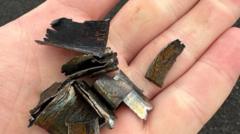Kathleen Folbigg, wrongfully jailed for 20 years over the deaths of her babies, has received an offer of A$2 million in compensation, which her lawyer and legal experts have deemed insufficient. The case, labeled a miscarriage of justice, raises broader questions about systemic flaws and the appropriate rewards for wrongful imprisonment.
Controversy Erupts Over Inadequate Compensation for Wrongfully Imprisoned Mother

Controversy Erupts Over Inadequate Compensation for Wrongfully Imprisoned Mother
Kathleen Folbigg's A$2 million compensation offer for her wrongful imprisonment has ignited debates over justice and the treatment of women within Australia's legal system.
Kathleen Folbigg's long and harrowing ordeal has recently garnered renewed attention after she was offered A$2 million (£975,580, $1.3m) in compensation following her release from wrongful imprisonment for the deaths of her four children. Once condemned as "Australia's worst mother," Folbigg was exonerated in 2023 after a judicial review suggested that her children's deaths could be attributed to a rare genetic disorder, rather than foul play.
Legal advocates argue that the proposed compensation is unjustly low given the egregious nature of the miscarriage of justice she experienced. Her lawyer, Rhanee Rego, emphasized the inadequacy of the amount, labeling it a "moral affront" and indicative of the system's continued failure to adequately support a victim of wrongful conviction. Folbigg spent two decades in prison before being found innocent, and comparisons have been drawn to other wrongful conviction cases in Australia, such as Lindy Chamberlain, who received $1.7 million for a much shorter prison sentence.
Attorney General Michael Daley provided context for the offered sum, stating that it followed extensive consideration of Folbigg's compensation application. However, Rego countered this by highlighting an inconsistency when juxtaposed against the severe emotional and psychological toll on Folbigg from her loss and wrongful imprisonment, stating that it did not reflect her suffering.
The deaths of Folbigg's children occurred between 1989 and 1999. The prosecution's case relied heavily on circumstantial evidence, including private journals where Folbigg expressed her struggles as a mother. With her conviction in 2003, she was sentenced to 40 years, which was later amended to 30 years on appeal. Yet, a significant inquiry in 2023 revealed that the children's deaths might have stemmed from completely natural causes due to gene mutations.
Experts expect that compensation figures could reach significantly higher than the current offer, with estimates suggesting it may need to exceed A$10 million to be suitable, and some analysts speck speculation of up to A$20 million. Folbigg's case has ignited a national discourse about the treatment of women within the legal system and the need for systemic reform to prevent future miscarriages of justice.




















